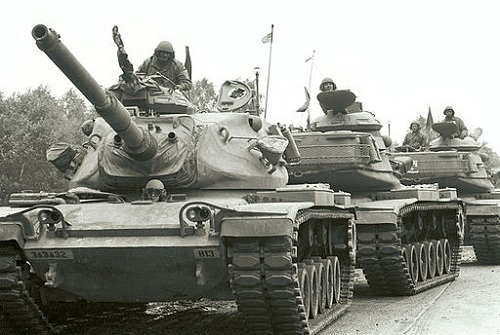Cold War
After the end of the World War II, relations between the USA and Soviet Union started deteriorating, triggering off the Cold War – a struggle between the two super powers to expand their areas of supremacy to secure their future in the event of another World War. Soviet Union established its dominance in Eastern Europe and focused on Central Asia, Middle East and North Korea. The USA sought to establish its hegemony in Western Europe, Latin America and South East Asia. The entire exercise had its roots in the mutual suspicion and deep distrust that the two superpowers had for each other.
Initially, the Cold War was limited to exchange of political views and analyses at international forums, including the UN. Subsequently, developments like the communists’ assumption of power in China, Soviet Union’s acquisition of nuclear weapons and war in Korea gave a military dimension to the Cold War. Both the superpowers were anxious to maintain balance of power and the undertone of their policies differed under reigns of different Presidents and Prime Ministers of the USA and Soviet Union respectively.
As both the capitalist and the socialist camps were anxious to safeguard their interests against loss of ground in international politics, proliferation of destructive nuclear weapons added fuel to the flame. From 1960s onwards, there was a hint of change in the attitude of the superpowers. After the Vietnam debacle, the USA softened its attitude towards Soviet Union and communist China. Soviet Union and China also reciprocated its attitude for the time being. The peace process got a setback when Soviet Union invaded Afghanistan and the USA renewed its enmity with Soviet Union by increasing its military budget.
The Cold War phase took a dramatic turn with Mikhail Gorbachev introducing liberal reforms like perestroika and glastnost to rejuvenate Soviet Union which was lagging behind the countries of the capital camp. However, such reforms could not ultimately save Soviet Union because it had already outlived its utility. People got disillusioned with the rigid totalitarian system which no longer fulfilled their expectation. Between 1989 and 1991, Soviet control over East European countries started collapsing, culminating in the fall of Soviet government itself.
With the eclipse of the socialist camp, the capitalist camp was left with no rival to contend with. After the completion of 45 years since its beginning, the Cold War came to an end.
Post Cold War
The post Cold War scenario was marked by the total absence of the conflict between the two superpowers in both theoretical and military sense. The arms race was considerably reduced and the first world countries focused on globalization, growth of free market economy and spread of technology. With virtually no challenge from the opponents of capitalism, the USA firmly occupied the supreme position. China also established itself as a force to reckon with by embracing capitalism and opening its door to the West. Almost all the global brands of consumer products like Pizza Hut and Kentucky Fried Chicken were made available in Chinese markets.
The end of the Cold War saw the end of racial discrimination in South Africa and a new government came to power through free election. There was an upsurge of liberal and nationalist forces in many countries, forcing the respective governments to loosen their grip on social and political institutions, facilitating free exchange of views. Stupendous growth of information technology revolutionized the process of dissemination of information across the world. Internet, which was originally created by Pentagon for use during a nuclear war, was made accessible to the common public. It has substantially changed the lives of more than one third of the world’s population.
- Difference Between Bharatanatyam And Odissi - February 22, 2016
- Difference Between Socialist And Democrat - January 11, 2016
- Difference Between Capitalism And Imperialism - January 11, 2016



The Cold War is one of the most important periods in the history of US-Soviet relations. I have been studying this event for a long time and I can say that it is a very interesting period in history. After all, this is a war that did not actually take place. I learned all about it at https://studydriver.com/cold-war-essay/. It is very convenient. Here you will find an essay on any topic. And most importantly, all essays are high quality and professionally written. They are very informative and interesting.
If the Cold War interests you as much as it interests me, I recommend reading it.
Reply
I didn’t have any expectations concerning that title, but the more I was astonished. The author did a great job. I spent a few minutes reading and checking the facts. Everything is very clear and understandable. I like posts that fill in your knowledge gaps. This one is of the sort.
Reply